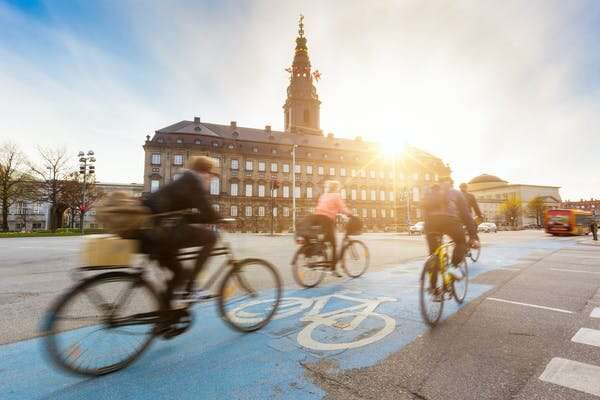Why a UK ‘biking and strolling revolution’ will not scale back automotive journey

The UK prime minister, Boris Johnson, has introduced £2 billion to create hundreds of miles of protected bike lanes and pedestrian area. There are many good causes to encourage strolling and biking—energetic journey, because it’s known as. The pandemic necessitates social distancing on public transport, which suggests buses and trains must ferry fewer passengers per journey. Biking and strolling are more healthy options and in the long run, each have an element to play in cutting carbon emissions from the transport system, in addition to enhancing city air high quality.
Cities throughout the UK are selling energetic travel in response to the pandemic. Manchester has dedicated £5 million to allow socially distanced cycling and walking on new routes. Sadiq Khan, the present mayor of London, has reallocated road space to pedestrians and cyclists to extend strolling five-fold and biking ten-fold.
A ten-fold improve in biking would take the current 2.5% share of journeys made by bicycle in London to the extent seen in Copenhagen, which is at the moment at 28%. The Danish capital has had glorious biking infrastructure for a while and a longstanding biking tradition.
However 32% of journeys in Copenhagen are by automotive, which is just rather less than London’s 35%. Except for biking, the opposite large distinction is public transport use, which accounts for 19% of journeys in Copenhagen versus 36% in London.
This all signifies that we are able to get individuals off buses and onto bikes, that are cheaper, more healthy, higher for the surroundings, and no slower on congested city streets. However it’s a lot tougher to get individuals out of their vehicles, even in Copenhagen the place everybody has expertise of protected biking.
The attraction of automotive journey
Individuals like vehicles as a result of they’ll carry multiple passenger simply they usually provide loads of area for the stuff we have to lug round. There are some journeys which can be only a bit too lengthy for a motorbike journey, or that require you to seem nicely dressed and clear while you arrive. Many individuals like vehicles as a result of driving them feels good. Simply have a look at the large selection in fashions, together with the current fashion for gas-guzzling SUVs.
Most vehicles are parked 95% of the time. If their house owners are solely utilizing them sparingly, maybe sharing automobiles and journeys could be a extra environment friendly possibility than strictly personal use. However the truth that so many individuals are prepared to pay some huge cash for one thing they solely use 5% of the time highlights the worth individuals place on private mobility.
The basic attraction of the automotive is the straightforward entry it permits to individuals and locations and alternatives and decisions—no less than when roads usually are not too congested and when it is potential to park at each ends of the journey. For entry to all this within the time accessible for journey throughout the busy day, the automotive is probably the most environment friendly mode of journey for reasonable distances.
When you stay in a village with no automotive, and with few or non-existent bus companies, your alternatives and decisions of labor, retailers and companies are restricted. Purchase a automotive and the chances develop considerably. Though there are a lot of concepts for changing vehicles outdoors cities, resembling e-bikes for lengthy distances, their complete affect isn’t likely so as to add as much as a lot.
However in cities, roads are sometimes congested and parking is proscribed. It is definitely potential to switch vehicles right here. Automobile use in London was at its peak within the early Nineties, when it accounted for 50% of journeys. As town’s inhabitants grew, street capability for vehicles was decreased to make room for bus lanes, cycle routes and pedestrian area. On the similar time, there was substantial funding in rail journey capability, all of which reduce automotive use.
Past densely populated cities, although, the price of rail funding is difficult to justify, and buses on congested roads do not make an interesting different to travelling by automotive. However buses on devoted routes freed from common visitors—generally known as bus fast transit—can work as a less expensive different to coach journey.
The pandemic lockdown confirmed how substantial adjustments to our journey behaviour are potential. A few of these are prone to be long-lasting, as extra individuals make money working from home, prepare conferences with videoconferencing, and store on-line. However much less commuting for work and leisure could possibly be offset by will increase in different kinds of journeys, as individuals really feel the necessity to get out of the home and interact with the broader world.
It isn’t clear how a lot we are able to rely on altering journey behaviour to assist decarbonise transport and reduce air air pollution. The federal government ought to as a substitute depend on changing fossil fuels with electrical energy—swapping combustion engines in vehicles, vans and trains with electrical batteries and motors.
Insurance policies to advertise strolling and cycling are worthwhile for the well being and environmental advantages they will inevitably carry. However they don’t seem to be prone to break the attract of the automotive on their very own, and the expertise of Copenhagen means that the most important pull shall be from public transport as a substitute.
This text is republished from The Conversation beneath a Artistic Commons license. Learn the original article.![]()
Quotation:
Opinion: Why a UK ‘biking and strolling revolution’ will not scale back automotive journey (2020, September 2)
retrieved 2 September 2020
from https://techxplore.com/information/2020-09-opinion-uk-revolution-wont-car.html
This doc is topic to copyright. Aside from any honest dealing for the aim of personal examine or analysis, no
half could also be reproduced with out the written permission. The content material is offered for data functions solely.
 hotebike
hotebike